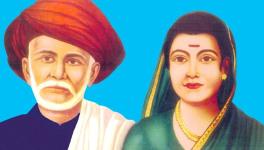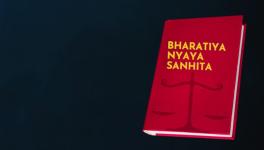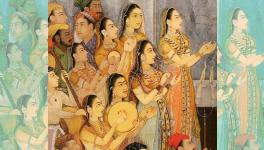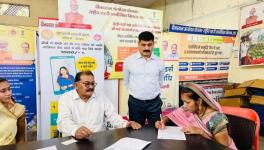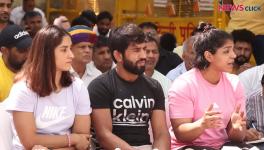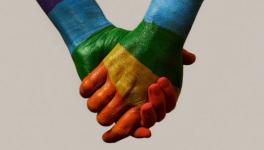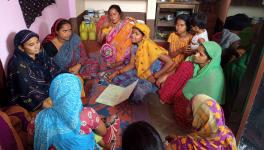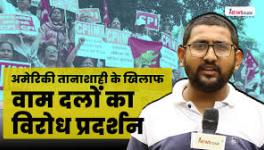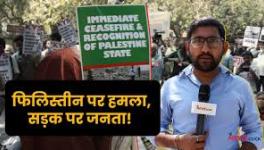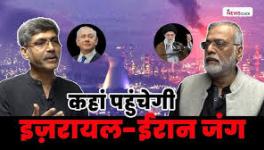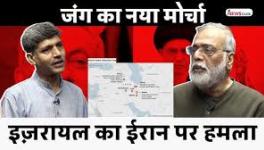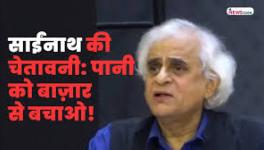Remembering the Rolling Stone of Women's Movement in India
Vina Mazumdar was among the significant figures in post-independent India who voiced for gender equality. Apart from being associated with the women's movement, Vina di, as she was fondly called, was among the pioneers in the field of women's studies in India. Among her many significant contributions was the report -- "Towards Equality" -- that the Committee on Status of Women in India, of which she was an integral part, brought out in 1974. She was also the founding director of the Centre for Women's Development Studies (CWDS) at New Delhi. In 2010, Zubaan published her autobiography, "Memoirs of a Rolling Stone." She passed away on May 30, 2013. To remember her contributions to the women's movement in India, Newsclick speaks to Dr. Indu Agnihotri, Director and Professor at the CWDS.
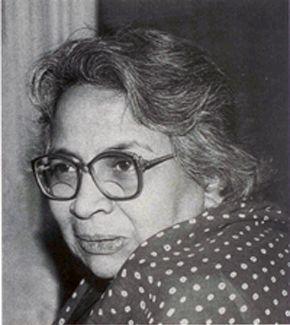
R. Nithya (RN): Welcome to Newsclick. To pay tribute to her contributions to the discourse on women's rights in India, today we are at the Centre for Women's Development Studies to talk about that remarkable woman of the Indian women's movement who passed away in the early hours of May 30 this year. Vina Mazumdar. She was 86 years old and was among the pioneers in the field of Women's Development Studies and a voice for gender equality. It is to talk about this rolling stone of the Indian women's movement that we have with us today Dr. Indu Agnihotri, Director and Professor at the CWDS. Welcome to the show Dr. Indu.
Dr. Indu, Vina Mazumdar was the founding director of the Centre for Women's Development Studies. Why did she want to set up such a centre and how far has the CWDS fulfilled that role?
Dr. Indu Agnihotri (IA): Well, as far as the setting up of the Centre goes, lets look at it in terms of the background of the Committee that Vina Mazumdar had beeen part of, which was the Committee on the Status of Women in India in the early 70s. The Report which is titled, “Towards Equality” was submitted at the end of 1974 and from 1975 onwards when it was printed and published, various people outside the Committee were infact reading the report and finding enough evidence in that to raise questions about the status of women in India 25 years after independence. I think this was something that Vinadi, as we all called her and many of her colleagues in the Committee were.. These questions were running in their minds as well because these were some of the most well educated women that independent India had produced. They had had a fairly well-privileged background in terms of the opportunities and exposure they had had for education etc. But when they went out as part of this Committee they travelled all across India and I think as Vinadi and her friends in this Committee would always talk about it for many many years after that, the fact was that they were totally shocked at what they saw. Poverty they saw, the kind of inequality, the kind of discrimination against women and a total denial of opportunities to women. And I think what they felt that they had to do then was that they had to come out of their own, sort of comfort zone, in a sense where they were at the universities or the institutions that they had always been a epart of and they felt that they had to take this forward in very many diffearent ways. One of the ways was that as part of the Committee itself they had been in touch with some of the women leaders in India; they had interviewed these people; they had commissioned studies on women in the economy, women in terms of legal rights, political representation, political participation, education. So, these were many of the fields that opened up in the course of the findings and work of the Committee. And I think, after the Committee's report was presented, as you would know, it was a report put together in time for the Mexico Conference, the first World UN Conference on Women in 1975. In fact in Mexico also, it turned out to be one of the most well-researched well-documented report. At the international level, it created quite a stir in the Mexico Conference and coming back from that Conference, what everyone had felt who had been associated with that Committee, they felt they had to take that agenda forward in different ways. The first step that Vina Mazumdar took was that she joined the Indian Council of Social Science Research, i.e., ICSSR which also set up the first Women's Studies unit in India. And which commissioned research around, with the focus on women and gender exclusion, gender inequalities etc. Subsequent to that, and you would be aware that the 1970s was the decade where in fact Developoment Studies was very much, I mean, on the rise, in terms of, all abroad, all international fora, you would find, Sussex has the Institute of Develpment Studies. So Development Studies was a new opening up field which took off from Economics primarily at one level, but also combined with interdisciplinary perspectives, to critique development policies and with a view to actually addressing social trends, inequalities on the ground and I think it was as part of that process that they took it forward further to then set up the first centre which was an independent centre under the ICSSR, supported by ICSSR and others with a focus on, research on women and the objective was to take forward both research with a focus on women which was sadly lacking in the 1970s. So you could have all the social science disciplines, for instance, conducting research and teaching with no specific mention of women. Many of us, for instance, I come from the discipline of History, that we could actually study History in a sort of gender neutral way. So I think there was a very clear agenda that policies, programmes – government, state level, state orientation had to be engaged with, interrogated and addressed as well as take it forward in terms of research which then emerged as women's studies as an interdisciplinary perspective. And she also helped set up the Indian Association of Women's Studies in 1981-82 which has also emerged as a full fledged professional body subsequently.
RN: Dr. Indu, as we know Dr. Vina Mazumdar was an activist as well as an educationist. How significamt do you think her dual role as an activist and as an academic was to her contribution to the women's movement?
IA: Vinadi had been associated with the Kothari Commission, when she was at the UGC and I think there was one thing very clear in her mind, education was one of the means and instruments to advance the cause of equality and not just gender equality, she believed in equality in social terms, in political terms, in economic terms and for her that remained a concern through out. Even as late as 1986, for instance, she was part of the drafting of the National Education Policy which took its title from something that she wrote, which is Education for Equality. That remained an agenda but, and, advancing education amongst women was a key concern as part of that and advancing education where it was to open up new fields, new opportunities and not just where the stereotypical notion of what should be the special kind of education that women should receive you know, this has been a debate in the system within, in the context of the education, because there is an understanding that people have, that women should be specially prepared for their future roles, which would be like mothers or whatever. And I think that was one thing that Vinadi very clearly disagreed with. She felt that you had to break out of the stereotypical types and education had to prepare women for all kinds of roles. So they should not be put in any kind of box; they should not be, sort of, subjected to prejudices and discriminations from their inception. So schools, schooling, school education, higher education were meant to open up more avenues and open up minds of young people. That was very clear in her agenda. As far as the movement is concerned, I think, her relationship to the movement was at several levels. She was, I don't think she was part of any organisation in terms of women's organisation except CWDS which she founded. But she used the institutional base of the CWDS and its rich resources in terms of the library that was built up, in terms of research that was generated, the kind of data that could be garnered which was an exercise she had already done as part of the preparation of the Report, “Towards Equality”. And she felt that this has to be fed even to bring in more critical perspectives within the movement, sort of, strengthen the interventions of the women's movement and therefore she was open to aligning herself with women organisations which existed at that time. Some of them were new. She played a key role in putting together a platform of national women's organisations which she sometimes, which she often referred to as seven sisters, but this was an organisation comprising of the All India Women's Conference which was one of the oldest organisation in India, the National Federation of Indian Women, YWCA, the Mahila Dakshita Samiti at that time , the All India Democratic Women's Association, CWDS itself and the Joint Women's Programme. So this network of national women's organisations, I think, played a key role and in that Vina Mazumdar and under her leadership, the Centre for Women's Development Studies played a key role in making one point I think which is central – that there was a need to engage with State policy; this need was determined and driven by the impact of these policies on the ground and on the everyday lives of ordinary women. So they were very much at the centre of the policy. It was not individual rights, it was not a particular class but the mass of women, the peasant women, the tribal women, women lying on the margins, women living in poverty, in socially, economically deprived segments of society. And I think the 70s saw a network, including of Development Studies, women associated with Development Studies and using those perspectives to engage with official policies – both at the international UN level as well as within their own countries.
RN: Dr. Indu, among her many contributions that you just discussed, what do you feel is her one most significant contribution to the women's movement?
IA: I dont know if I can say that there is one single contribution because I think she was an institution builder, she believed in inculcating critical thought amongst us, she believed also in encouraging young scholars, young minds, she always found time to sit down and discuss with people, young students who she met at conferences. She would sit up late in the night discussing with younger people. Very few people who saw her only in the later years know that since 1980-81, she had started a whole process of what we call Action Research, which was very dear to her heart and she very passionately involved with programmes for collective mobilisation and organisation of peasant women and tribal women and CWDS is still running those programmes in 3 districts. She was able to convey a sense of and the need for critical thought and develop that spirit amongst women who had historically and socially been denied opportunities, to develop those skills and she saw that as a challenge; she took it on and she sustained that challenge for a long time. I mean she could have comfortably continued to be a social scientist, serving on committees as and when the government called upon her but I think she took that as a calling particularly from what she saw in the course of her travel during the preparation of the Committee Report on the Status of Women in India. So I would say that she was a very very multifacted personality. To capture her contribution in any one way, is may be to see it in a limited sense. If you saw what she contributed as pressure in terms of government policies, new thinking, new initiatives, for instance, it was in the course of 1980 dialogue on the Sixth Plan that this idea of allocating 40% of resources to women and to women's development and targetting them at women was floated and somewhere that still continues to hover. You know this whole thing of 1/3 rd critical mass, 1/3 rd in terms of reservations which was an issue she had raised in “Towards Equality” and she and Lotika Sarkar had dissented from the other members feeling that more concrete and specific efforts needed to be made to draw women into the political process if India was to develop as a stable and vibrant democracy. As I said, she was a student of politics and history and she understood the social dynamics and processes very well. And she sought to put her energy in taking the process of democratic engagement with policy, planning and social change on the ground; welding all these things together.
RN: Speaking of reservations, those were the major reasons behind her position on women's, reservation for women?
IA: She didn't believe in tokenism of any kind. She didn't. She felt women had to be there in their own right as citizens. But then, special efforts had to be made because there were long histories of discrimination, long histories of cultural discrimination as well as political, I mean, caste based or class based inequalities. As a social scientist, she had a more wholistic perspective. She looked at it from all possible aspects and she felt that critical interventions were needed and she would not shy away from that; she would not shy away from differing from a government position if she felt that that was not going to take this process forward.
RN: Being part of the women's movement, what would feminism mean to her, specially in the Indian context?
IA: You know, I think her position on feminism was slightly different from many others. She didn't, I mean, she didn't, she hardly ever used to use the word feminist to either describe herself or her activity or work. She stood for interventions on behalf of women. And women as being part of society. So she would not want to see women as a separate category from other aspects of social development.
RN: One final question Dr. Indu. What kind of impact or influence did Vinadi have on you?
IA: I don't know if I can answer that. I mean I met her in 1978 when I was still a young student, when efforts were on to bring out a magazine, which all of you might have heard of, called Manushi, of which she was the first publisher and we had an editorial collective. I was part of the editorial collective. And since then, I can't, I mean looking back on my life, I can't think of not knowing, having known Vinadi not just in terms of my relationship with her, in terms of interaction but in terms of I think a sharing of ideas, sharing of concerns and finally for me it was a very long process in my different capacities as a student, as a teacher, as a teacher of History at Delhi University, as an activist and then subsequently as a colleague in CWDS. But I think what brought us together really was the common concerns and also I think we shared our grounding in history and concerns about the future of democracy and social change in India. And I think that's what kept us together.
RN: Thank you for talking to us Dr. Indu.
IA: Thank you.
Get the latest reports & analysis with people's perspective on Protests, movements & deep analytical videos, discussions of the current affairs in your Telegram app. Subscribe to NewsClick's Telegram channel & get Real-Time updates on stories, as they get published on our website.











